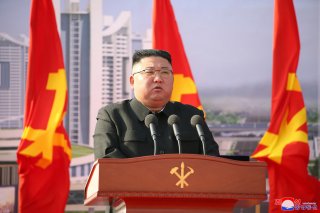How Stable Is North Korea Right Now?
The collapse of North Korea has been predicted on and off since the end of the Cold War, but North Korea persists despite these predictions.
News more troubling than usual is coming out of North Korea. In the summer of 2020, the country was hit by a series of natural disasters in the midst of the coronavirus pandemic. In January 2021, North Korean leader Kim Jong-un said that the country’s five-year economic plan had failed. In June, he admitted that the country’s food situation is “getting tense.” While the government maintains that there have been zero cases of coronavirus within its borders, reports suggest the country has been at least somewhat affected. Though the picture of what is going on in North Korea is far from clear, these pieces of information suggest that the North Korean people may very well be facing their most dire living conditions in decades. However, the U.S. government should not assume that North Korea is on the verge of collapse.
The collapse of North Korea has been predicted on and off since the end of the Cold War, but North Korea persists despite these predictions. North Korea lost substantial financial support with the fall of the Soviet Union and the strengthening of South Korea-Russia ties in the early 1990s. Flooding and famine in the mid-1990s supported forecasts that the North Korean state was near its end. Predictions of regime failure also gained traction as Kim Jong-un took over leadership of the country in 2011 in his late twenties. These days, Kim’s occasional disappearances from public life trigger intense speculation over the state of the regime and the potential for instability.
In addition to internal crises that threaten to destabilize the regime, the Kim regime faces external forces that attempt to shape the regime’s decisions and undermine its strength. The United Nations and some member states have enacted sanctions targeting a wide range of North Korean economic activity—from luxury goods and energy imports to seafood and coal exports. However, this isolation from the international economic system has not prompted the regime to end its weapons of mass destruction programs or illicit activities. Instead, the regime has used these illicit activities—including cybercrime, currency counterfeiting, and narcotics trafficking—to generate income in the face of destabilizing forces.
Though North Korea is likely under stress, the United States should not assume the Kim regime’s demise is imminent. Indications of internal instability should be considered in the broader context of a regime that has repeatedly demonstrated incredible resilience to both internal and external threats. U.S. policy should treat North Korea as a long-term challenge. In the meantime, the United States should do what it can to support average North Koreans when they are faced with a public health or food crisis while recognizing that ultimately, responsibility for their plight belongs with a regime that prioritizes elite privilege over public welfare.
Abigail Bard is the Asia Policy Analyst at the Center for American Progress.
Image: Reuters

